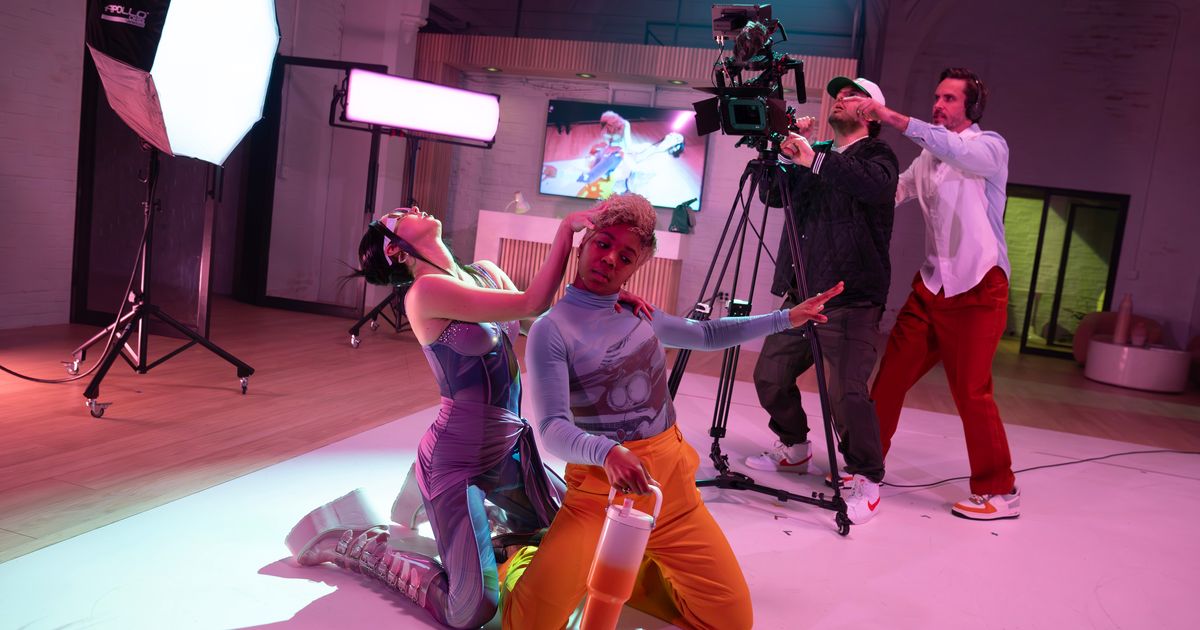There’s discussion, and then there is The Discussion. One is compact speak, the other huge. 1 is how persons communicate when they really do not care who’s listening, and one is how people today publicly execute their motivation not so a great deal to being ethical as to remaining recent — and, if at all possible, worthwhile. Ife Olujobi is out to skewer both in her new engage in, Jordans, a satire with a skewed, nightmarish edge. As these, Jordans joins a extensive, abundant tradition, just one that has been significantly vigorous in modern years. During its two-ish several hours, I assumed of Mara Nelson-Greenberg’s Do You Truly feel Anger?, Jordan E. Cooper’s Ain’t No Mo’ (which also commenced existence in the Public’s LuEsther Corridor), Slave Perform, Sorry to Bother You, and Get Out. Jordans doesn’t arrive together with the astonishing power of some of its companions in the variety, but it’s absolutely taking a daring 50 %-courtroom shot. “Well, the playwright is fearless,” the male sitting down beside me claimed beneath his breath as the exhibit swung into its second act. 20 or so minutes afterwards, he additional, “Okay … what are you accomplishing?”
I will not spoil just about anything major, but the display makes crystal clear early on that we’re likely on a ride. You can feel it in the tone — the bubbles and cracks in the slick semblance of normalcy. Cha See’s lights flicker, the actors’ bodies warp and tremble, and Fan Zhang’s underscoring throbs with surreal menace. (Zhang is the production’s undercover hero her seem design and style is a pulsing, ever-transforming regular, undertaking some significant hefty lifting in a enjoy that has to navigate lengthy stretches of motion without the need of dialogue.) If the creepy-crawly vibes weren’t plenty of, very well, there is also the articles warning: “Jordans includes sexually specific articles, nudity, vomit, violence, and blood.” Oh, and using tobacco and strobe lights. Woo! This spot has almost everything. But even if you are headed for a wild R-rated showdown, satire is still a deceptively challenging style. In its tries to be cutting, it can conclude up staying noticeable it also threats getting rid of monitor of what accurately it came below to do apart from excoriate. Olujobi will get caught in the two these corners, but at the exact time, they’ve received a keen ear and a large-run bullshit meter, and there are times when Jordans’ pointed nails do in truth leave a mark.
The title refers to a pair of characters who will close up, like issue and anti-subject, tearing each individual other aside. The 1st is Jordan (Naomi Lorrain, whose silent facial expressions are splendidly calibrated), the receptionist and all-about abused dogsbody at Atlas Studios, a sickeningly trendy “rental studio and output facility” in an unnamed place that’s definitely Williamsburg or Bushwick. Atlas hosts picture and online video shoots, launch parties, and regardless of what else. It’s “the type of place where something can materialize for a cost,” Olujobi’s phase directions note dryly. (It is a fantastic gag when, sooner or later, a single of the white ensemble users — Brian Muller, nailing it — shows up as Lil Klonopin, a deal with-tattooed, G-Star-sporting “rapper and influencer” who’s introducing his new line of watchbands.) Jordan is Atlas: She does all the function, will make all the coffee, orders all the salads, picks up all the dry cleaning she carries the globe on her shoulders. It is not a delicate graphic, but it’s central to Olujobi’s task. Jordan is the only Black individual at Atlas, and she’s a lady, and while it’s quite blatant to have her lugging home furnishings across the again of the stage although two of her white-girl colleagues make a feminist speech to their white-woman boss — “Here in this office environment … who is actually undertaking the get the job done? … Like, who has to be the mother, the babysitter, and the maid? … Who is literally slaving away, early morning until night time, nonstop, and not receiving any credit?” — it’s still an observation with a total-ass leg to stand on. Jordan by now lives in a nightmare. “I operate in an place of work owned by an evil succubus, staffed by very little L-coach demons,” she shudders. Then Jordan shows up.
I’ll phone him Male-Jordan for clarity. Man-Jordan (Toby Onwumere), a Black person “from the globe of promoting,” wears a hip match, talks a huge video game, and smiles a large smile. He’s below as the new “Director of Culture” due to the fact, as Hailey (that’s the evil succubus, played wolfishly by Kate Walsh) has spelled out to her pale underlings, “WE HAVE A Tradition Issue.” Olujobi has picked a juicy goal: Even as rollbacks by Republicans and assaults by narcissist billionaires acquire large chunks out of them, DEI initiatives are themselves overripe for parody anybody who has found them in motion understands that, at this position, they are as probably to skew hypocritical, superficial, and overtly commercial as they are to stem from honest makes an attempt at restructuring and reparation. Theater has witnessed its personal model of the glass cliff about the earlier 5 several years: In the wake of We See You White American Theater, Black people and individuals of shade ended up hired in a determined flurry into management or adviser positions, but almost nothing about the inner workings or values of the establishments that hired them had altered. They were set up to are unsuccessful, and several are now both leaving or being jettisoned as men and women all over again glance the other way.
Jordans has its sights preset on the morning after the evening of our very good (or at least excellent-on the lookout) intentions, and it is sharpest when sending up not only the hollow, crassly profiteering incorporation of DEI into a white-dominated workplace but also the approaches this new program — supposedly this sort of a moral evolution from the old 1 — even now pits Black folks against one particular one more, like vassals waging bloody war about small gains when, in point, the king even now owns every thing. “You’re listed here,” Jordan tells Dude-Jordan, “because some white persons felt negative about killing Black persons and designed these fake ‘culture’ jobs for people like you, to make on their own seem much better devoid of acquiring to self-mirror.” (In the meantime, Guy-Jordan’s upbeat aspirational patter, easy fashion sense, and unbothered code-switching kept reminding me of Karamo Brown, whose function on Queer Eye is … tradition specialist. Woof.) But Jordan’s own cynical fact-talking arrives with a expense. “Oh, I know I’m a sellout,” she carries on when Man-Jordan goads her in excess of her individual shit-using placement at Atlas. “My soul has still left the creating, and I have to make peace with that every working day.”
A tragedy is gestating at the center of Jordans, and it has to do with the way the title figures, acquiring been routinely dehumanized, hardly ever the moment approach just about every other with actual humanity. In one of the play’s flashes into the grotesque, Hailey sniffs hungrily around Dude-Jordan’s armpits and paws at his torso, but it is not just the white individuals who act like animals. The Jordans circle each individual other with claws out, staking out territory and, for purely dominance-associated reasons, accomplishing mating dances. Regardless of whether they struggle or fuck (they do both), it is all just a subject of competition.
Which is a unhappy, strong heart for a engage in, but Jordans doesn’t rather manage to land the airplane. As Olujobi pushes further and further more into the surreal, things commence to come to feel underbaked. Just in advance of the present reaches its wacky-grisly climax, Jordan provides a quite extended speech that, even with Lorrain’s sharp psychological concentration, still seems far too a great deal like a monologue-composing exercising. And as unusual issues get started happening to both equally Jordans’ bodies, and their pretty identities become Cronenbergishly fused (since, as Jordan observes — again, with a certain degree of predictability, but alright — the white folks “can’t notify us apart”), Olujobi gets a lot more intrigued in shock than in pathos. It may be a element, but the fact that neither Jordan is truly deeply fleshed out feels like a skipped option to insert pressure to the play’s supposed intestine punch. Who are they, or who were they, past the strategies in which racism and ambition have either hardened or duped them?
It might also be that, to go exactly where it definitely wants to go, Jordans is crying out for even even larger, nastier theatrical alternatives. Director Whitney White and her designers do effectively adequate at effecting the play’s tonal slips into the ominous and weird, but she hasn’t figured out how, with the resources offered, to provide what Olujobi is purchasing, which is total mess and chaos. When the plumbing goes haywire at the climax of Act A single, we really should be witnessing an explosion of the literal bullshit beneath Atlas’s shiny white floor, but what we get is a couple of modest, conveniently manageable onstage leaks. When violence goes down or fluids have to fly, the staging feels a little tough and tentative, the Guignol not nearly grand enough. Jordans aims to acquire us to a position of horror and hysteria, a put where the laughter becomes a choke, a gag, a howl. But it hasn’t gone significantly enough at both conclude of the satirical spectrum. On one side, the inhuman scale on the other, beneath the zingers and jabs, the bruised human hearts that are, somehow, even now beating.
Jordans is at the General public Theater by means of May well 12.
Olujobi uses she/they pronouns, and I’ll be utilizing both equally in this piece.










